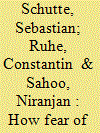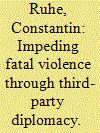| Srl | Item |
| 1 |
ID:
190934


|
|
|
|
|
| Summary/Abstract |
Earlier research on ethnic and religious conflict has identified fear as an important motivation. While theoretically sound, this expectation has never been tested at larger scales in ongoing episodes of political violence. Instead, conceptual progress has been made in lab experiments. Combining insights from observational research and stylized experiments, we predict that fear for personal safety due to witnessed violence causes prejudice against out-groups, enhanced internal cohesion, and support for extremist actors. To test these predictions, we conducted surveys in the Indian State of Uttar Pradesh with identical respondents in three waves starting in January 2017. The surveys continued during the tense Legislative Assembly elections in the Spring. The results largely corroborate the theoretical expectations and present a hard in-vivo test of long-standing conjectures.
|
|
|
|
|
|
|
|
|
|
|
|
|
|
|
|
| 2 |
ID:
180193


|
|
|
|
|
| Summary/Abstract |
Existing research provides no systematic insights into if and how mediation impedes battle-related deaths. Therefore, this article presents a temporally disaggregated analysis and assesses the effect of mediation on monthly fatal violence. The article predicts that adversaries evaluate opponents’ trustworthiness from both fighting and negotiation behavior. It argues that reducing fighting intensity during negotiations is a sign of cooperation, which can be negotiated by mediators to build trust. Over the course of mediation, the content of negotiations provides information about how genuinely a conflict party is interested in conflict resolution. Only if mediation achieves negotiation of core incompatibilities will conflict parties be willing to reduce fighting intensity. Under these conditions, information revealed in a mediation process can build trust and substantively reduce violence. An empirical analysis of all African conflicts between 1993 and 2007 supports this prediction and shows that on average mediation is followed by substantive and lasting reductions in fatal violence, if mediation discusses the conflict’s main incompatibility. In contrast, mediation on other topics is associated with a small, fleeting reduction in violence. Data of battle-related fatalities in Syria during negotiations as well as qualitative evidence further support the theoretical mechanism and the model prediction. The study concludes that mediation can reduce conflict intensity substantively, if it achieves exchange between conflict parties on the main conflict issues.
|
|
|
|
|
|
|
|
|
|
|
|
|
|
|
|